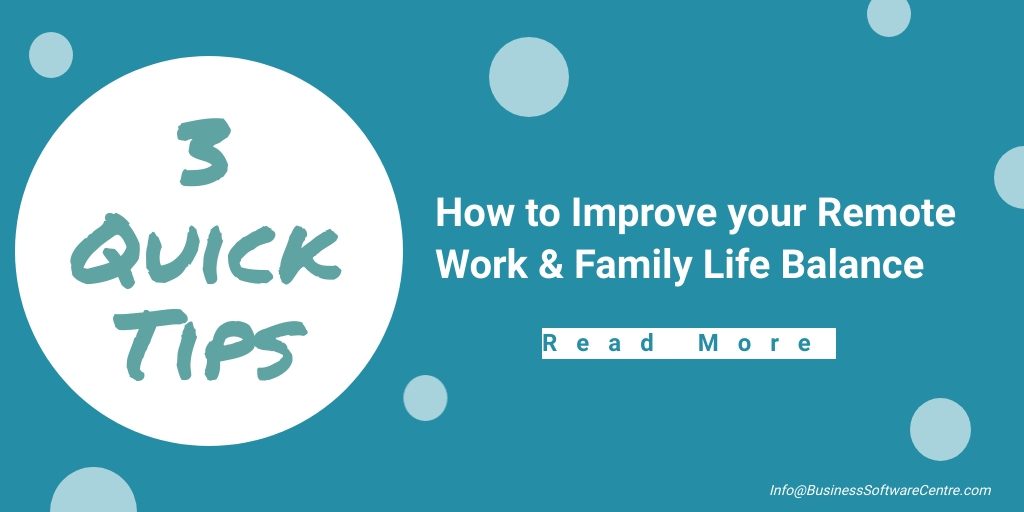Want some quick tips on how to improve your remote work & family life balance?
Remote working used to be a perk of a job, often included once a month or once a week in a work week to the average office worker. I remember applying for jobs fresh out of university and seeing remote work listed as a job bonus!
But times have changed. Since lockdown in March 2020, the perks of remote working might not even seem like perks… now 1 out of 5 Brits are working from home full time. We have noticed an increase of stress because of this shift in remote work. Primarily, the balance of work and family life has blended, almost making it impossible for remote workers to separate the two.
According to the latest Microsoft study on Covid-19 and remote work, many remote workers (about 45%) are feeling the burnout! Some signs of burnout include:
(Source: Very Well Mind)
If you think this is you, do not worry! I have come up with a list of the top 3 things you can do to help with your work and family balance to ensure you do not feel continuous stress.
Tip 1: Learn how to Prioritize
This may seem like a no-brainer, but you would be surprised to know many of us do not write down list of tasks or attempt to put our tasks in order from most to least importance. When you are working from home, where many of us are not separated by our families, creating a priorities list will help ensure you put the right amount of attention and focus into your work and your family. This list, also known as a to-do list, will give milestones throughout the day that can be reached in an organized way. Microsoft does offer ways to help create these lists and keep you on track, “Planner and Teams work well together. The Tasks app in Teams combines all your Planner and To Do tasks and pairs team and personal to-dos with advanced collaboration tools.” (Source: https://www.microsoft.com/en-gb/microsoft-365/business/task-management-software)
Likewise, when you prioritize and set your daily or weekly goals, you are learning how to hold yourself accountable. Once your tasks are complete, your happiness and sense of accomplishment increases! My last piece of advise here is to make sure these goals are as realistic for you as possible, that way you know you can achieve them. There is no point in saying you will complete a 100 page report in one day… that is not reasonable and you will feel defeated at the end of your day with that goal.
Tip 2: Stop Multi-tasking
As much as this might hurt to hear, we as humans do not perform well when multi-tasking. Learn how to complete a task before starting another. Or, if you have to leave a task mid-way through, be sure to set a reminder to finish it later. For example, you are writing a report up for the finances of your business but you also need to cook lunch for your kids. In this situation, rather than trying to cook and write at the same time, stop the writing task, and solely focus on cooking… otherwise you might burn the food or get the wrong information on the report! It is not healthy for our brain to work on overdrive, which is what multi-tasking does. This is the reason why mistakes happen too. Take your tasks one task at a time to help reduce your stress levels. This may seem hard at first, but with practice you CAN change your behavior and learn how to take tasks one at a time.
Tip 3: Learn how to Time-Manage
Maybe this is a sub-category of learning how to prioritize, but I think having it as it’s own section shows the importance of time management. Set a hard- time to end your workday. Studies show that working beyond 35-40 hours a week increase employee stress and unhappiness. If you continue to allow your job to work over your contract hours agreed, you are not only hurting yourself but encouraging a very unhealthy work culture to develop.
Of course, time-management also applies to family time. With Microsoft Teams you can set personal reminders on your calendar to remind you of birthdays, holidays, appointments, or other family events. By programming this in with your workday schedule, you can see where your time should be allocated throughout the day.
This also applies to your own needs like errand running, house cleaning, appointments, etc. You are important so please do not forget about you! Schedule time for yourself to take care of your personal tasks. Likewise, you can schedule times for breaks. In early 2021 Microsoft will launch their Headspace integration which will allow you to program meditation, breaks, or relax time throughout your workday.
There are many other tips out there on how to balance your remote work and family life, but I believe there may be the top 3. However, an honorable mention I wanted to add is you need to learn how to say ‘NO.’
‘NO” may be an uncomfortable word for us to use, especially for the people-pleasers out there, but using ‘NO’ can help you in the long run! ‘NO’ is uncomfortable to say to our bosses, our colleagues, or our families, but taking on more than what we can handle will only keep us unhappy and unhealthy. Would you rather feel the quick pain of saying ‘no’ or feel the long-term consequences of always saying ‘yes’? I would rather say ‘no’ and let those feelings of guilt hit me for a minute than say ‘yes’ and have resentment and anger build up over time.
Remote work is a new territory that many of us are navigating. Remember you are not alone! For more information on remote working and balancing family life, please email: [email protected]

